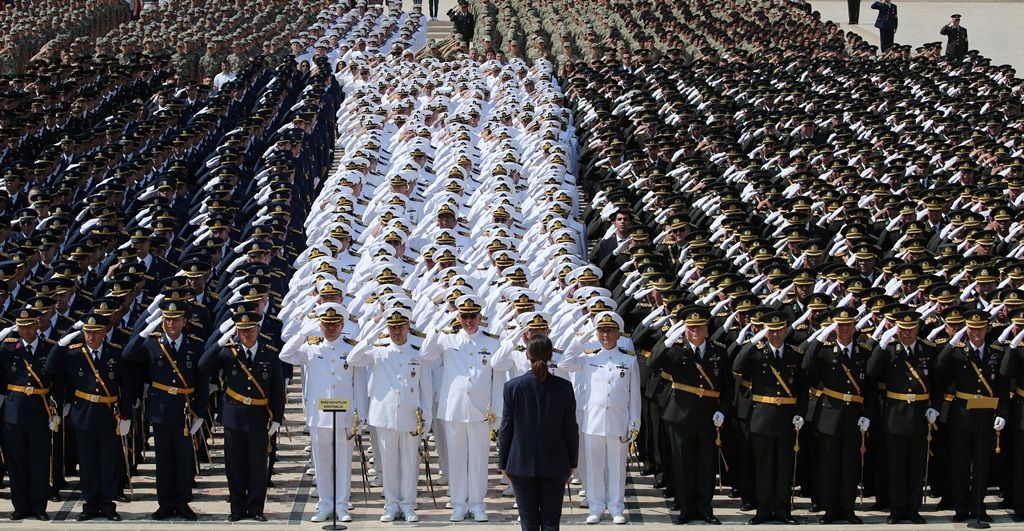Perspectives of Turkey’s Foreign Policy under the Presidential System

After the unsuccessful coup and introduction of a state of emergency in July 2016, two trends have marked Turkish foreign policy: brinkmanship and balancing allied commitments and cooperation with other states. Examples of brinkmanship include Turkey’s threat that it was ready to sacrifice relations with the U.S. if it was unwilling to compromise on Syria. Difficulties in its relations with allies and the global vision of foreign policy prompted Turkey to seek other partners. One manifestation of this was the negotiations regarding the purchase of an S-400 anti-aircraft and anti-missile defence system from Russia. After the introduction of the presidential system, these trends can be expected to be maintained.
The Foreign Policy of the “New Turkey”
In his election programme, Erdoğan stressed that Turkey would be guided by several principles: independence, the national interest, national security, and a moral stance. The aim is to implement the vision of a “leader state”, or one of the most important actors in international relations. This means a continuation of Turkish foreign policy since 2002. It encompasses, for example, building complementary (not competitive) relations with as many partners as possible and presenting Turkey as the leader of the Muslim world. The latter was indicated by a fragment from programme which hostility towards Islam was defined as a threat to Turkey. At the same time, the Turks will be more willing to use force to defend their interests, especially in the fight against terrorism. This is evidenced by the announcement that operations in Iraq and Syria will continue.
Implementation of the Erdoğan’s programme will be supported by the clear subordination of foreign policy to the president. This trend has been visible since 2016 and the composition of the new government indicates it will continue. Mevlüt Çavuşoğlu has been harmoniously cooperating with the president and remains at the helm of Turkish diplomacy. The Defence Ministry, in turn, was given to former Chief of General Staff Gen. Hulusi Akar. This will make persuading the military elites to continue Turkey’s military operations abroad easier. Erdoğan’s influence on foreign policy will also increase because of changes to the diplomatic corps. The likely effect of the presidential system will be a larger number of political nominations. This is a big change for Turkish diplomacy, as only 12 ambassadors now are from outside the bureaucracy.
Thus, Turkish foreign policy will be shaped primarily by Erdoğan as an extension of his internal policy. This was clearly expressed by Çavuşoğlu, who said that from now on there will be no distinction between the country’s foreign and domestic policy. Hence, foreign policy will be a mix of pragmatism and emotional, ideological declarations. Moreover, its subordination to the president will make it more vulnerable to sharp turns. The changeability in foreign policy is also a consequence of Turkish decision-makers’ vision, best expressed by the president’s spokesman, İbrahim Kalın, who promotes the concept of a “360-degree foreign policy perspective”. It is based on a view of the international order as becoming increasingly “multipolar”, which requires Turkey to cooperate with states from various political and cultural circles.
Consequences for the EU and NATO
With the end of the campaign, the Turkish politicians may, for tactical reasons, seek to reduce the tensions in relations with allies, especially European ones. Improving relations with the EU is important in light of Turkey’s recent economic problems and may be helpful in overcoming investor worries.[1] NATO remains the guarantor of state security.
At the same time, Turkey will probably strive to redefine relations with its partners, in particular with the EU. This is evidenced by Çavuşoğlu’s statements. In one interview, he suggested that Turkey would still be interested in accession negotiations but that they are not considered a priority. Turkey’s goals in its relations with the EU are reform of the customs union, attaining a visa waiver, anti-terrorist cooperation and resolving migration issues. This means that Turkey prefers to have a transactional relationship with the EU rather than being focused on accession negotiations, which placed Turkey in the role of an inequal partner.
Turkey is unlikely to end its membership in NATO. On the contrary, it probably will try to increase its activity in the Alliance, for example, by continuing to participate in the mission in Afghanistan or by engaging in a “spearhead” force. The proposal to reform NATO’s force structure, under which one of the national military commands (in Istanbul) would be transformed into an Allied command centre, and the promise to fulfil the 2% of GDP defence spending criteria by 2024, are also examples of that. However, Turkey’s foreign policy vision means that the Allies will not be able to count on Turkey’s support in deterring Russia. The Turks will continue to distance themselves from initiatives that could be negatively viewed by the Russian authorities. As a result, Turkey will remain a challenge for NATO cohesion.
Moreover, there will be tensions of a different sort between Turkey and its Western partners. On the one hand, these tensions will result from difficulties in the perception of Turkish foreign policy, which may seem inconsistent to its allies. On the other hand, a misunderstanding may result from the implementation of Erdoğan’s programme; for example, addressing Islamophobia in Europe or engaging in military operations targeting Kurdish groups outside Turkey may inflame tensions within the Turkish diaspora in EU countries, which might worsen relations. In addition, slogans calling for revision of the international order, repeated in the campaign, may have an anti-Western dimension. Also, internal policy needs may induce Turkey to periodically increase tensions with its partners. An example of this is Erdoğan’s attempt to shift responsibility for the country’s current economic problems onto the U.S.
Recommendations
The evolution of Turkish foreign policy requires its Western allies to skilfully choose the measures that allows the Turks to be aware of both the benefits of the relationship and the cost of acting against the collective interests of its partners. The most useful instruments to remind Turkish politicians of the importance of cooperation are economic. Reform of the customs union between Turkey and the EU could serve this purpose. The impact of this instrument would increase if in the future the U.S. and the EU return to talks on trade partnerships similar to the TTIP. A positive signal—especially for the Turkish public—would be if the EU waived visas for Turks.
Security cooperation also plays an important role. The NATO allies could make a positive impact on Turkey by giving it clearer support in combating the propaganda of the outlawed Kurdistan Workers’ Party in Europe. Also, key here is Turkish-American cooperation on Syria. Finding compromise between Turkey and the U.S. in this matter would definitely strengthen the rank of the western vector in Turkish politics. An important role in the security sphere could also be played by the EU. However, this would require opening the PESCO to third countries.
At the same time, it would be beneficial for the allies to increase the costs of these activities of Turkish politicians, which affect the collective interests of NATO and the EU. Turks should be aware that the weakening of Alliance's cohesion will be met with response. It could include, for example, restrictions on the sale of weaponry or the exclusion from the circulation of secret information in the event of Turkey’s actions violating the policy of deterring Russia. It would also be beneficial to eliminate the anti-Western rhetoric of Turkish politicians because it affects Turkish society. According to a survey from the end of last year almost 70% of Turks believe that the Alliance is not indispensable to provide the country with security. However, in this case, an information campaign directed at the public, which would remind the Alliance's contribution to Turkey's security, could have a better effect than the pressure on Turkish decision-makers. Such a campaign would also be helpful in weakening Russian propaganda, which is very active in Turkey.
[1] K. Wasilewski, Turkey’s Economic Problems before the Elections, “PISM Bulletin”, No. 78 (1149), 8 June 2018.





